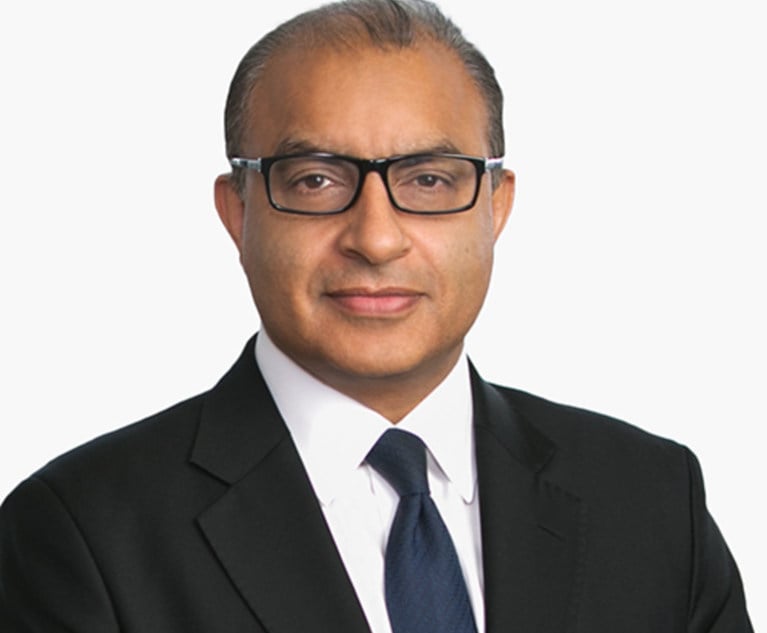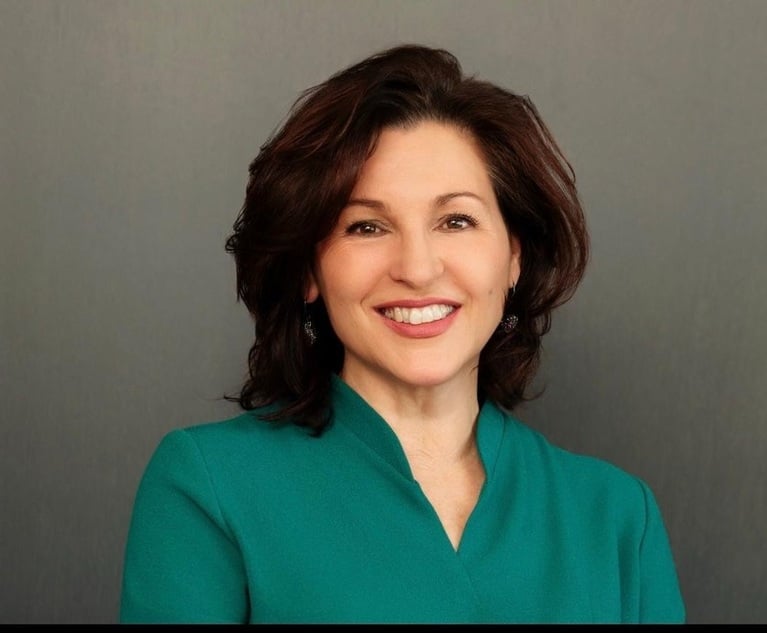Ex-Sanctions Official Jumps to Hughes Hubbard as Trump Vows New Restrictions
On the same day the president announced a return to economic sanctions on Iran, Hughes Hubbard brought on a veteran of the DOJ's sanctions team from Baker McKenzie.
May 08, 2018 at 05:27 PM
4 minute read

Hughes Hubbard & Reed's announcement Tuesday that it had landed international trade partner Ryan Fayhee from Baker McKenzie was well timed.
The Department of Justice veteran came on board to lead the firm's sanctions and export control group on the same day President Donald Trump announced plans to reimpose sanctions on Iran.
Fayhee spent 11 years with the DOJ, which included a term as national export control coordinator, the principal attorney overseeing export control and sanctions investigations and prosecutions nationally.
“I once thought—when I was with the DOJ starting in on sanctions work in 2008—that we'd never be busier,” Fayhee said. “Here we are with Iran in the news today, and also Russia and North Korea.”
As a prosecutor, Fayhee handled cases involving export controls, sanctions, cybercrime, trade secret theft and espionage. He had a lead role in the investigation and prosecution of a multinational oilfield services company that in 2015 received a $232.7 million penalty for facilitating illegal transactions and engaging in trade with Iran and Sudan.
That fine, paid by a Schlumberger Ltd. subsidiary, is the largest criminal fine to date for U.S. sanctions violations.
Fayhee said that prosecution was emblematic of how U.S. sanctions have grown more complicated, especially for multinational corporations that grew outside of the United States but then took on characteristics that made them subject to American jurisdiction.
“I use a Superman analogy. Back in 2008, Iran, Cuba and North Korea were essentially kryptonite to U.S. persons. They couldn't facilitate or participate in commerce in any of those countries. Now, U.S. authorities are using sanctions to get at a broader range of offenses,” he said.
For example, while Russia “is not kryptonite with regard to all U.S. persons,” the government is using sanctions to target individuals who have certain interests in Russia.
“Rather than being country-based, they're looking to focus on specific sectors and individuals to effectuate change,” he said of DOJ officials. With regard to compliance, banks and other trade facilitators are now on the front lines.
However, Fayhee noted, the prospect of renewed sanctions on Iran marks a return to that earlier world.
Fayhee left public service in the middle of 2015 and spent almost three years as a partner in Baker McKenzie's Washington office before his move to Hughes Hubbard.
His clients at the firm included Russia-based anti-virus firm Kaspersky Lab Inc., which sued the Trump administration in November, claiming the government has unlawfully banned the company's software from within U.S. federal agencies.
Fayhee described his new platform at Hughes Hubbard as more “disputes focused” than at his prior firm.
“It's very strategic-minded. It has a good well-established trade practice,” he said. “Along with my sanctions skill set, it's a great place to use some of my investigations skills as a former prosecutor.”
In addition to his international trade work at the DOJ, Fayhee also worked as a trial attorney in the civil fraud section and served as an assistant U.S. attorney in the Northern District of Illinois.
“International trade is an increasingly important component of our transnational business,” Hughes Hubbard chair Ted Mayer said in a statement. “We think Ryan brings substantial strengths in export controls and sanctions that will prove extremely valuable to our clients on their most sophisticated issues.”
A spokesman from Baker McKenzie did not immediately respond to a request for comment Tuesday.
This content has been archived. It is available through our partners, LexisNexis® and Bloomberg Law.
To view this content, please continue to their sites.
Not a Lexis Subscriber?
Subscribe Now
Not a Bloomberg Law Subscriber?
Subscribe Now
NOT FOR REPRINT
© 2025 ALM Global, LLC, All Rights Reserved. Request academic re-use from www.copyright.com. All other uses, submit a request to [email protected]. For more information visit Asset & Logo Licensing.
You Might Like
View All
Law Firms Expand Scope of Immigration Expertise Amid Blitz of Trump Orders
6 minute read

Trending Stories
- 1Uber Files RICO Suit Against Plaintiff-Side Firms Alleging Fraudulent Injury Claims
- 2The Law Firm Disrupted: Scrutinizing the Elephant More Than the Mouse
- 3Inherent Diminished Value Damages Unavailable to 3rd-Party Claimants, Court Says
- 4Pa. Defense Firm Sued by Client Over Ex-Eagles Player's $43.5M Med Mal Win
- 5Losses Mount at Morris Manning, but Departing Ex-Chair Stays Bullish About His Old Firm's Future
Who Got The Work
J. Brugh Lower of Gibbons has entered an appearance for industrial equipment supplier Devco Corporation in a pending trademark infringement lawsuit. The suit, accusing the defendant of selling knock-off Graco products, was filed Dec. 18 in New Jersey District Court by Rivkin Radler on behalf of Graco Inc. and Graco Minnesota. The case, assigned to U.S. District Judge Zahid N. Quraishi, is 3:24-cv-11294, Graco Inc. et al v. Devco Corporation.
Who Got The Work
Rebecca Maller-Stein and Kent A. Yalowitz of Arnold & Porter Kaye Scholer have entered their appearances for Hanaco Venture Capital and its executives, Lior Prosor and David Frankel, in a pending securities lawsuit. The action, filed on Dec. 24 in New York Southern District Court by Zell, Aron & Co. on behalf of Goldeneye Advisors, accuses the defendants of negligently and fraudulently managing the plaintiff's $1 million investment. The case, assigned to U.S. District Judge Vernon S. Broderick, is 1:24-cv-09918, Goldeneye Advisors, LLC v. Hanaco Venture Capital, Ltd. et al.
Who Got The Work
Attorneys from A&O Shearman has stepped in as defense counsel for Toronto-Dominion Bank and other defendants in a pending securities class action. The suit, filed Dec. 11 in New York Southern District Court by Bleichmar Fonti & Auld, accuses the defendants of concealing the bank's 'pervasive' deficiencies in regards to its compliance with the Bank Secrecy Act and the quality of its anti-money laundering controls. The case, assigned to U.S. District Judge Arun Subramanian, is 1:24-cv-09445, Gonzalez v. The Toronto-Dominion Bank et al.
Who Got The Work
Crown Castle International, a Pennsylvania company providing shared communications infrastructure, has turned to Luke D. Wolf of Gordon Rees Scully Mansukhani to fend off a pending breach-of-contract lawsuit. The court action, filed Nov. 25 in Michigan Eastern District Court by Hooper Hathaway PC on behalf of The Town Residences LLC, accuses Crown Castle of failing to transfer approximately $30,000 in utility payments from T-Mobile in breach of a roof-top lease and assignment agreement. The case, assigned to U.S. District Judge Susan K. Declercq, is 2:24-cv-13131, The Town Residences LLC v. T-Mobile US, Inc. et al.
Who Got The Work
Wilfred P. Coronato and Daniel M. Schwartz of McCarter & English have stepped in as defense counsel to Electrolux Home Products Inc. in a pending product liability lawsuit. The court action, filed Nov. 26 in New York Eastern District Court by Poulos Lopiccolo PC and Nagel Rice LLP on behalf of David Stern, alleges that the defendant's refrigerators’ drawers and shelving repeatedly break and fall apart within months after purchase. The case, assigned to U.S. District Judge Joan M. Azrack, is 2:24-cv-08204, Stern v. Electrolux Home Products, Inc.
Featured Firms
Law Offices of Gary Martin Hays & Associates, P.C.
(470) 294-1674
Law Offices of Mark E. Salomone
(857) 444-6468
Smith & Hassler
(713) 739-1250











